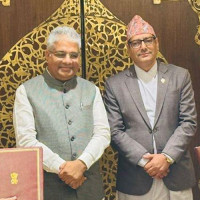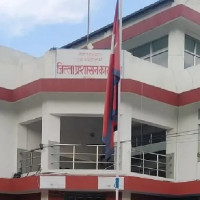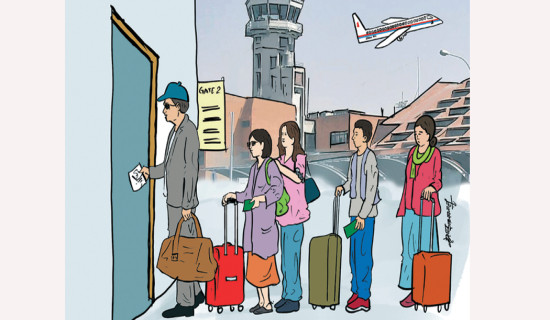- Thursday, 26 February 2026
Bangladeshi agents found active to send Nepalis abroad, eight arrested
Kathmandu, Feb. 25: Cases of Bangladeshi nationals overstaying their visas and working illegally in Nepal have surfaced before. However, a recent police investigation following the arrest of seven Bangladeshis has revealed some shocking new facts.
Among them, Anik Ambrose Rosario, a Bangladeshi national, had entered Nepal on a tourist visa and was allegedly involved in facilitating the migration of both Nepali and Bangladeshi citizens to European countries through various manpower agencies and consultancies.
According to the police, Anik was merely an agent operating from Kathmandu. Data retrieved from his mobile phone indicates that he had arranged for 315 individuals to travel abroad—215 to Romania, 45 to Kosovo, 19 to Serbia, 25 to Bosnia, and 11 to Malta—for employment and education purposes.
What is even more alarming is that his phone contained records of 4,028 Nepali passports, raising serious concerns about identity security and illegal migration.
Authorities also recovered five original Nepali passports from Anik, belonging to Dev Bahadur Tamang, Dinesh Pariyar, Kabiman Gurung, Sanam Gurung, and Karma Rai, along with one Bangladeshi passport.
According to Kaji Kumar Acharya, Superintendent of Police and Spokesperson for the Kathmandu Valley Crime Investigation Office, Teku, Anik arrived in Nepal on January 2, 2025. Before that, while in Bangladesh, he had applied for a job at Alternative Recruitment Pvt. Ltd. through the website BD Jobs.com and had successfully secured a position there.
During police interrogation, Anik confessed that his employer, Mohammad Mirza Ghalib, had assigned him to work in Nepal as an agent.
"My job was to receive passports sent via courier or phone instructions and hand them over to designated individuals as per company directives," Anik said while giving police statement during interrogation.
"Each individual seeking to migrate had to pay between Rs. 65,000 and Rs. 70,000 for submitting their passports to the agent," said SP Acharya.
According to the police, various manpower agencies and education consultancies who wish to go to Europe first establish contact with Anik, who would either meet them in person or collect their passports and payments.
Initially, the passports were couriered to the Alternative Recruitment Pvt. Ltd. office in Bangladesh. Once the company processed visas and labour approvals, the passports were sent back to Nepal, after which Anik distributed them to the respective individuals.
Modus operandi
"Although Anik entered Nepal on a tourist visa, it is evident that he was engaged in an organised network facilitating illegal migration through manpower agencies and consultancies," said Senior Superintendent of Police (SSP) Ramesh Kumar Basnet.
"Since this case presents a new dimension of illicit activities and immigration, we have intensified our investigation," he claimed.
Officials involved in the probe suspect that Nepal’s Department of Foreign Employment and courier companies may have indirectly facilitated these illegal operations for financial gains.
"The pattern is clear—Nepali passports are being couriered to Bangladesh, and after processing, they are sent back to Nepal, leading to individuals flying to Europe," a senior police official said.
"The key question is — what our government agencies -- especially labour department and courier companies -- have observed and monitored to check such discrepancies?"
The investigation team coordinated with Nepal’s Department of Immigration to determine Anik’s legal consequences. Following discussions, the department decided to impose a fine and deport him back to Bangladesh.
Alongside Anik, eight other Bangladeshi nationals were also arrested. However, since there was no evidence linking them to illegal activities, and their visa status was still valid, they were released after minor interrogation.
The other arrested Bangladhesis include -- MD Atikul Islam, MD Alam Mola, Jahangir Alam, Aminul Haq, Amdadul Ahaque, MD Nasiruddin, and MD Mosaraff Hosen Holadar.
Hundreds of Bangladeshi
nationals are currently residing in Nepal under tourist visas, primarily working as electricians and construction labourers.
Police have been actively monitoring and arresting those found overstaying their visas, subsequently handing them over to immigration authorities.
In the past, Bengali individuals were also found involved in Voice over Internet Protocol (VoIP) call bypassing scams, an illegal operation that allowed fraudulent international call routing.






-original-thumb.jpg)









